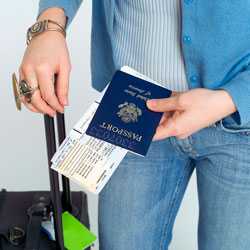Flu-Free, Healthy Travel this Winter
 Whether traveling to warmer weather or a snow-filled adventure, make sure the flu is not your travel companion.
Whether traveling to warmer weather or a snow-filled adventure, make sure the flu is not your travel companion.
It’s not too late to get a flu vaccine if you haven’t already done so. It takes 2 weeks for the vaccine to provide protection, so get vaccinated well before your trip to reduce your risk of catching and spreading the flu.
Wherever you may be going this winter, protecting yourself and others from the flu is important. Here are some useful tips for staying healthy during the winter months.
Before Your Trip
Get vaccinated.
Flu vaccines are the most important tool we have for preventing the flu. If you have not gotten your vaccine already, it’s important to get it before you travel. Flu vaccines are available in many places, including doctors’ offices, health departments, and pharmacies. You can also use the HealthMap Vaccine Finder if you need help finding places that offer flu vaccine in your area. Getting vaccinated now is the best way to protect yourself against the flu.
Prepare a travel health kit.
Remember that prevention can be travel-sized! Include items in your kit that might be helpful if you get sick, such as tissues, pain or fever medicine, soap, and an alcohol-based sanitizer to use in case soap and water are not available. For other health items to consider, see Pack Smart.
Traveling outside the United States this winter?
- Learn about health information for your destination.
- Before you travel, see a doctor familiar with travel medicine to get any vaccines, medicines, and information you need to stay healthy.
- Talk to your doctor if you are at high risk for flu complications. Depending on your situation, your doctor may advise you to take antiviral medications with you when you travel, especially if appropriate medical care is not available at your destination.
- Know what to do if you become sick or injured on your trip.
- Visiting an area where there is a risk of malaria? If so, then seek medical care right away if you have a fever. The first symptoms of malaria usually include fever and chills, similar to the symptoms of the flu. However, if malaria is left untreated, the disease can quickly become serious and even life threatening.
Travel only when you feel well.
If you have the flu, your doctor may prescribe antiviral drugs to treat flu infection. Prompt treatment with antivirals is especially important for people at high risk of serious complications or people who are very sick with flu. These drugs can make your flu illness shorter, milder, and reduce the chance of flu complications.
During Your Trip
Here are some simple things you can do to take care of yourself and keep others well:
- Avoid close contact with sick people.
- Remember to travel only when you feel well. (See above.)
- Cover your coughs or sneezes with a tissue. No tissue? Then cough or sneeze into your sleeve, not your hands.
- Wash your hands often with soap and water. If soap and water are not available, use an alcohol-based sanitizer.
- Avoid touching your eyes, nose, and mouth.
More Information
More Information

Before you travel outside the United States, talk to a doctor about what you need to stay healthy.
CDC Features
- Page last reviewed: December 14, 2015
- Page last updated: December 14, 2015
- Content source:
- National Center for Immunizations and Respiratory Diseases
- Page maintained by: Office of the Associate Director for Communication, Digital Media Branch, Division of Public Affairs




 ShareCompartir
ShareCompartir